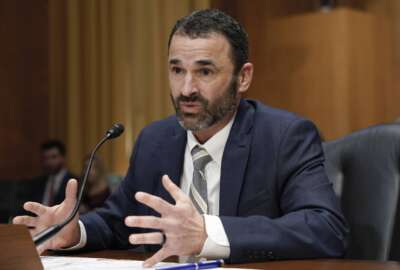Hubbard Radio Washington DC, LLC. All rights reserved. This website is not intended for users located within the European Economic Area.
IGs face obstacles, delays in accessing agency records
A trio of inspectors general told the House Committee on Oversight & Government Reform today about obstacles they routinely encounter in obtaining records a...
Inspectors general are facing significant challenges obtaining the information they need from agencies to conduct their investigations in a timely manner. This not only impedes the IGs’ ability to do their jobs, it also delays oversight of wrongdoing and, in some cases, allows wrongdoing to continue unabated.
These were some of the issues discussed Tuesday at a hearing of the House Committee on Oversight & Government Reform entitled “Inspectors General: Independence, Access and Authority.”
“The Inspector General Act could not be clearer — Inspectors General are entitled to complete, timely, and unfiltered access to all documents and records within the agency’s possession,” said Michael Horowitz, Justice Department IG, in his written testimony. “Delaying or denying access to agency documents imperils an IG’s independence, and impedes our ability to provide the effective and independent oversight that saves taxpayers money and improves the operations of the federal government. Actions that limit, condition, or delay access have profoundly negative consequences for our work: they make us less effective, encourage other agencies to take similar actions in the future, and erode the morale of the dedicated professionals that make up our staffs.”
Horowitz’s office first encountered difficulties accessing information in 2010. That’s when the FBI took the position that Section 6(a) of the Inspector General Act (IG Act) did not entitle Justice’s IG access to all of the FBI’s records. In particular, Justice claimed that OIG did not have access to “certain records in its possession, such as grand jury, Title III electronic surveillance, and Fair Credit Reporting Act information, because of disclosure limitations in statutes other than the IG Act,” Horowitz wrote.
From that point on, the FBI refused the OIG’s requests.
In an attempt to resolve the issue, Justice’s leadership asked the Office of Legal Counsel in 2014 to render an opinion on the legal issues put forward by the FBI. More than eight months later, OLC has yet to release its opinion.
“I cannot emphasize enough how important it is that OLC issue its opinion promptly because the existing process at the Department, which … essentially assumes the correctness of the FBI’s legal position, undermines our independence by requiring us to seek permission from the Department’s leadership in order to access certain records,” Horowitz wrote. “The status quo cannot be allowed to continue indefinitely.”
In the interim, Congress included a provision in the Fiscal Year 2015 appropriations legislation — Section 218 — that prohibited Justice from using appropriated funds to deny the OIG’s requests or impede the timely release of records, unless those records fall within the restrictions of Section 6(a) of the Inspector General Act.
Horowitz told committee members that even though the law was enacted in December, the FBI is still delaying the release of information by reviewing all of the requested documents first before releasing them to OIG, a process he called costly and time-consuming.
“It is long past time to resolve this legal dispute,” Horowitz said. “The FBI’s position contradicts the plain language of the IG Act. Congress’ clear intent when it created our office, the FBI’s and the department’s practice prior to 2010 of providing the very same categories of information to our office without any legal objection, court decisions by two different federal district judges stating that our office could receive grand jury material and the reasoning of the 1984 decision by the Office of Legal Counsel concluding that grand jury material could be provided to the department’s Office of Professional Responsibility.”
Horowitz is hopeful that the OLC will conclude that IG Act entitles his office the ability to access all records in the department’s possession. But, if the OLC comes to a different conclusion, he told committee members he’d be willing to work with them to come up with a legislative solution.
EPA IG seeks access to CSB documents
“The concept underlying the IG Act is fragile,” Arthur A. Elkins Jr., the IG at the Environmental Protection Agency, told the committee. “It can be likened to a house of cards. The removal of the cooperation card, will cause the foundation upon which the house is built to collapse.”
Elkins had testified before the committee on June 19, 2014, about difficulties his office was facing in its investigation of the U.S. Chemical Safety and Hazard Investigation Board (CSB). Officials at the CSB refused to comply with the OIG’s requests, citing attorney/client privilege.
At that time, the committee chairman and ranking member instructed the CSB to produce the documents OIG had requested. CSB released the documents but failed to provide confirmation that it had fully complied with the request, leaving it unclear if the IG had all the documents it needed for the investigation.
“In August 2014, the OIG asked Chairman [Rafael] Moure-Eraso and other senior CSB officials to affirm their methodology for searching and identifying documents within the scope of OIG’s requests, and that they had fully complied with the requests,” Elkins said, in his written testimony. “At this time, none of the CSB officials have done so.”
Although the EPA OIG never received the confirmation it was seeking, it was able to complete its investigation with the documents in hand.
“Last week, I sent the OIG’s report of investigative results to President Obama, as there is no one higher than Chairman Moure-Eraso at the CSB, and he is appointed by the President,” Elkins wrote. “That report finds that there is evidence sufficient to support a conclusion that the Chairman and two of his senior officials violated the Federal Records Act, and implementing regulations, by using non-governmental email systems to conduct official government business and not capturing those emails in the CSB records system.”
Another challenge the EPA OIG faces is in the area of the “intelligence” aspect of some of the information it is seeking in its investigations. The OIG must first obtain permission from the EPA in order to access certain information.
“This situation impeded the OIG’s ability to investigate threats against EPA employees and facilities, conduct certain misconduct investigations and investigate computer intrusions,” Elkins wrote. “In addition, [EPA’s Office of Homeland Security] was conducting investigative activities of its own, without any legal authority to do so, thereby interfering with — and in some cases fouling — OIG investigations.”
Elkins first brought this to the attention of the committee at a September 2014 hearing. Since then, senior officials from the EPA and OIG have met to hammer out the issues.
“What we have agreed upon is that there is no category of activity at the EPA to which OIG does not have unfettered access, as provided by the IG Act,” he wrote. “The ‘intelligence’ activities can and are to be shared with the OIG if the OIG seeks access or an issue is within OIG purview. One specific impediment to being able to reach agreement previously was a memorandum of understanding (MOU) that the EPA had entered into unilaterally with the Federal Bureau of Investigation (FBI). The OIG was not party to, nor was it consulted in, creating that MOU. The EPA asserted that the MOU precluded it from sharing information with the OIG.”
Senior FBI management has since told EPA that it doesn’t require information to be withheld from the OIG. EPA has also told the OIG that going forward it will share the information the OIG has been seeking in previous matters on an ongoing basis.
“We have yet to have a three-way meeting among the EPA, the OIG and the FBI to confirm all of this, and to rescind or substantially modify the MOU,” Elkins said.
Legal opinion limits Peace Corps IG’s access to sexual assault records
Kathy Buller, the Peace Corps IG, told the committee that most of the challenges her office has faced in obtaining information concerned access to volunteer reports of sexual assaults.
“Our push for access is about fulfilling our collective responsibility to ensure that we — Congress, the Peace Corps, and OIG — do everything we can to ensure our volunteers, who sacrifice so much when serving in remote corners of the world, receive the services they need when they are victims of a sexual assault,” Buller wrote in her testimony to the committee.
On July 9, 2013, the Peace Corps’ former general counsel drafted a legal opinion that the Kate Puzey Volunteer Protection Act of 2011 limited the IG’s broad right of access to agency records as provided by the IG Act. Because of this decision, the Peace Corps put in place policies that restricted the IG’s access to information.
Since Buller last appeared before the committee in September, the Peace Corps has updated its policies and procedures to allow the IG with greater access to the records.
“It’s worth reminding the Committee that these revisions took two years of discussions with the agency and members of Congress, two congressional hearings, negative press coverage, a hold being placed on the nomination of the Director, and, ultimately, the signing of a memorandum of understanding (MOU) between the agency and OIG,” she said. “Despite this progress, the underlying legal opinion supporting those policies and procedures is still in place and much work remains to be done to undo the damage caused by these access-denying policies.”
Buller told the committee that Congress and Peace Corps have the power to solve this issue.
“Congress could take legislative action to ensure that we get full access to agency records,” she said. “The Peace Corps, for its part, could retract the erroneous legal opinion underlying is misguided policies. As long as that opinion remains in place, Peace Corps is free to rescind our agreement and withhold or delay OIG access to sexual assault reports. Moreover, its very existence sets a dangerous precedent, whereby any agency may withhold information by deciding to interpret a law as overriding the IG Act. Allowing agencies to decide when they will or will not release information to their IG presents a clear conflict of interest. Not only that, it forces IGs to spend their limited time and resources wrangling with the agency to obtain information as I have done for over two years. Taxpayers and volunteer victims of sexual assault in particular deserve better.”
RELATED STORIES:
Justice Dept. IG complains of interference
Agency watchdogs seek more independence, budget boost
Copyright © 2024 Federal News Network. All rights reserved. This website is not intended for users located within the European Economic Area.
Michael O'Connell
Michael O’Connell is senior digital editor of Federal News Network optimizing content for the best user experience. Follow @moconnellWFED
Follow @moconnellWFED





